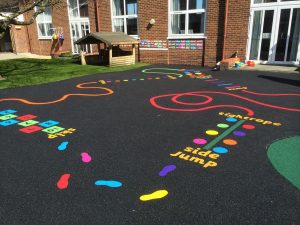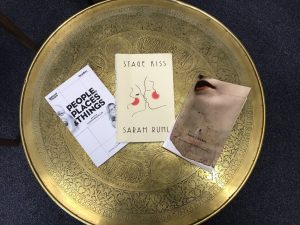Contributed by Jamie Harper:
For those of you who attended my lectures back in March, you might remember an exercise when I invited you to write questions or comments on pieces of paper, scrunch them up, then throw them at me. The rule was that if you hit me, I’d read out the question/comment and respond to it in some way. One of the questions asked whether I thought it fair that practical assessments for this course involve group, rather than individual, marks.
To my shame, I ducked the question, firing back with: ‘Do YOU think it’s fair?’
This was a poor response to a good question, so I’m writing now to offer an answer. My response is to say: ‘NO. IT’S NOT FAIR!’
But then, in the words of Mr Fletcher, my brilliant A-Level English teacher, ‘Life’s not fair’.
This might seem like a facile thing to write, so let me explain myself a bit more. Although it might seem ‘fairer’ to be marked as an INDIVIDUALS, this approach has problematic implications. In my view, you never learn as an INDIVIDUAL. The knowledge and capacities that you have gained over the course of your life have been determined by the people around you. If you grew up in a bubble, without the benefit of social communication with others, you would not know how to speak or think in abstract terms about things outside your immediate surroundings. The social nature of learning is fundamental to your capacity to think beyond the limited horizon of your lived experience – so it makes little sense to assess the quality of your learning by looking at you as an isolated individual. The success of learning is predicated on the success of the social networks that make it possible in the first place.
YOU ARE NOT ALONE.
Living, working and studying alongside others is not easy. Sometimes we just want people to get the hell out of our way so that we can forge ahead in the pursuit of our own genius. This is the argument of Henry David Thoreau who decided, in 1845, to go off on his own into the woods by Walden pond to build a cabin and live in supreme isolation with his lofty thoughts. In his book, Walden, Thoreau argues that human excellence can best be pursued by stripping oneself out of burdensome social structures that weigh people down with possessions they don’t need and relationships that they don’t want. Some of his proposals are attractive. Wouldn’t it be nice to get rid of all of the junk that weighs us down and free ourselves of social obligations?
Maybe…but what Thoreau overlooks is that his ability to build a cabin, read books, write and think lofty thoughts are all consequences of social support structures that shaped his learning.
HE WAS NOT ALONE.
Many of you, like Thoreau, might want to slip out of the burdensome requirement to engage with ‘inconvenient’ study group partners in your work on SEL1031. Wouldn’t it be nice to just pursue your own genius?
Perhaps…but although it might result in a better mark for you, what about the others? The question of what happens to ‘inconvenient others’ has implications that go well beyond the focus of this course, but indulge me, dear reader, in some speculative thinking and writing which (hopefully) has some relevance to the studies that you’re engaged in.
The day before I came up to Newcastle to do my two lectures, I was walking from the tube in the Seven Sisters area of North London, where I live. Two teenage girls approached me in the street and asked if I had a spare cigarette. I replied: ‘Sorry, I don’t smoke’ (smoking is bad) and walked on. As I passed the girls, one of them muttered some pretty nasty words and I paused to say: ‘There’s no need to swear at me’. At this point, the two teenagers turned around, charged towards me, and got right up in my face with a barrage of ‘WHAT DID YOU SAY? OH MY GOD! WHO THE FUCK ARE YOU? WHAT DID YOU SAY?’
I was stunned, shocked, and although the girls were probably only 15 or so, I was scared. Eventually, they stood aside and let me go on my way, but one of them gave the parting gesture of a gob of spit in my face. Nice huh?
When I got home, I turned on Newsnight (watching the news is the best) and they were talking about massive increases in the number of children being excluded from schools. I thought quite a bit about the two girls I had encountered and wondered whether they might be on the exclusion list. In the immediate aftermath of the event I thought – yes, thugs like that should be excluded, but then I started thinking about what happens if we do stuff like this. Maybe nicer students get to do their thing in peace and quiet, but if the inconvenient others are refused access to social learning spaces the likely outcomes of life on the margins are bleak.
My argument is that learning success is never simply a measure of how good you are as an individual. It is a measure of how good our social networks are in supporting everyone’s development. That means rejecting the impulse to turn away from people who might be ‘inconvenient’ for us, because to do so is to undermine their potential (and ours) to participate in the social spaces that are fundamental to learning.
To participate is not an individual activity. It is to take ‘a part’, to claim a stake in the shared activities that make up the social world. So my invitation to you is to willingly embrace the inconvenience and difficulty of group collaboration as you approach these final assessments. It might seem fairer to be marked as an individual, but this approach separates us from our peers and affirms an individualistic political culture that corrodes the social structures that make all learning possible.
In sum: don’t be like Thoreau. Choose to be a participant, because you never have been, and never will be, ALONE.

 I have probably already exposed myself as someone who loves a bit of celebrity by showing the David Oyelowo youtube video in my Wednesday lecture, so naturally I jumped on Kirsten’s idea. Lecturers – we’re just like you!
I have probably already exposed myself as someone who loves a bit of celebrity by showing the David Oyelowo youtube video in my Wednesday lecture, so naturally I jumped on Kirsten’s idea. Lecturers – we’re just like you!
